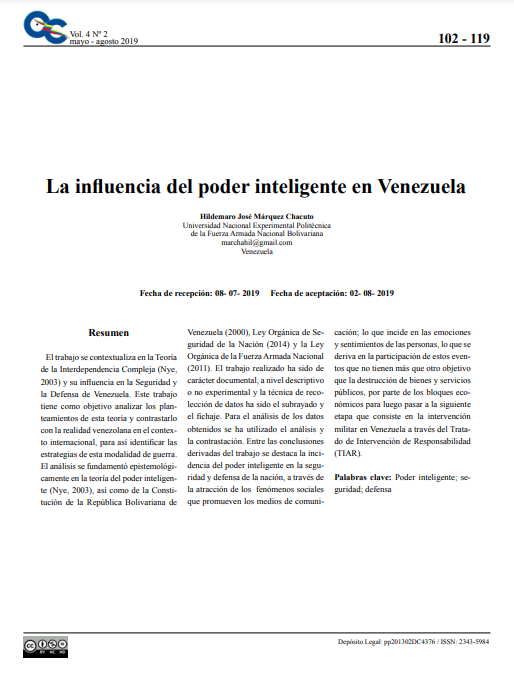The influence of smart power in Venezuela
Keywords:
Intelligent power;, segurity, defenseAbstract
The work is contextualized in the Theory Complex Interdependence (Nye, 2003) and its influence on the Security and Defense of Venezuela. This work aims to analyze the approaches of this theory and contrast it with the Venezuelan reality and in the international context to identify the strategies of this type of war. The analysis was based epistemologically on the Intelligent Power Theory (Nye, 2003), as well as on the Constitution of the Bolivarian Republic of Venezuela (2000), Organic Law on Security of the Nation (2002) and the Organic Law of the Armed Forces National (2011). The work carried out has been documentary, descriptive or non-experimental, and the technique of data collection has been underlining and signing. For the analysis of the obtained data, the analysis and the contrast have been used. Among the conclusions derived from the work, the incidence of Intelligent Power in the Security and Defense of the nation stands out, through the attraction of the social phenomena promoted by the media; what affects the emotions and feelings of the people, what is derived in the participation of these events that have no other objective than to destroy public goods and services, the economic block and then move on to the next stage that consists of the military intervention in Venezuela through the Treaty of Intervention of Responsibility (TIAR).
Downloads
References
Arias, F. (2006). El Proyecto de Investigación. Introducción a la Metodología Científica. 5ta Edición. Caracas: Editorial Episteme.
Celis, C. (1989). Introducción a la seguridad y defensa. Ed. Industrias Gráficas Integral C.A: Maracay.
Celis, C. (1991) Defensa para la seguridad. Ed. Industrias Gráficas Integral: Maracay.
Centeno, R. (2007). Guerra Asimétrica, Política y Arte Militar (1 Ed). [Libro en Línea].9 (71-83). Disponible: https://www.academia.edu/6762885/combate_de_resistencia_poltica_arte_militar [Abril: 2019, 12].
Comando Estratégico Operacional (2011). Concepto Estratégico Militar para la Defensa Integral de la Nación. Caracas.
Constitución de la República Bolivariana de Venezuela. (1999). Gaceta Oficial de la República Bolivariana de Venezuela, 5.453 (Extraordinaria) Marzo 24, 2000.
CSIS Commission On China. (2009). Smart Power in U.S.-China Relations. A report of the CSIS Commission On China. Washington D.C.; CSIS Press.
FTI Consulting (2013). Plan Estratégico Venezolano. [Documento en Línea]. Disponible: https://actualidad.rt.com/opinion/eva_golinger/view/110489-documento-evidencia-plan-desestabilizacion-venezuela-golinger [Consulta Mayo, 2019, 13].
Griffiths, J. (2011). Teoría de seguridad y defensa del continente americano. Análisis de los casos de Estados Unidos de América, Perú y Chile. Ril Editores: Chile.
Keohane, R. (1993). Instituciones internacionales y poder estatal. Editorial: GEL. Buenos Aires.
Ley Orgánica de las Fuerzas Armadas Nacionales. (2011). Gaceta Oficial de la República Bolivariana de Venezuela. Nº 6.020 (Extraordinario) Marzo 21, 2011.
Ley Orgánica de Seguridad de la Nación (2002). Gaceta Oficial de la República Bolivariana de Venezuela 37.594, Diciembre 18, 2002.
Nye, J. (2002). The Paradox of American Power. Why the World’s Superpower can’t go it Alone. New York; Oxford University Press. [Documento en línea]. Disponible: https://www.goodreads.com/book/show/87418.The_Paradox_of_American_Power [Consulta: 2019, abril, 22].
Nye, J. (2002). The Paradox of American Power. Why the World’s Superpower can’t go it Alone. New York: Oxford University Press. [Documento en línea]. Disponible: https://www.goodreads.com/book/show/87418.The_Paradox_of_American_Power [Consulta: 2019, abril, 22].
Nye, J. (2003). Cómo recuperar el poder inteligente de Estados Unidos. Project Syndicate. [Documento en línea]. Disponible: http://www.projectsyndicate. [Consulta: 2019, abril, 22]. Projects.
Nye, J. (2004). Foreing Police. [Artículo en Línea] Disponible: https://foreignpolicy.com/author/joseph-s-nye-jr/ . [Consulta: 2019, abril, 22]. Foreing Affair: New York.
Nye, J. (2004). Soft Power. The Means to Success in World Politics. New York; Public Affairs. [Documento en línea]. Disponible: https://www.belfercenter.org/sites/default/files/legacy/files/joe_nye_wielding_soft_power.pdf [Consulta: 2019, abril, 22].
Nye, J. (2008). The Powers to Lead. [Documento en Línea]. Disponible: http://www.projectsyndicate. [Consulta: 2019, abril, 22]. New York; Oxford University Press.
Nye, J. (2009). Get Smart. Combining Hard and Soft Power. En Foreign Affairs. [Documento en línea]. Disponible: http://www.foreignaffairs.com/articles/65163/joseph-s-nye-jr/getsmart. [Consulta: 2019, abril, 22].
Nye, J. (2011). The Future of Power. [Artículo Publicado]. Public Affairs: Nueva York.
Nye, J. (2018). How Shap Power threatens soft power. [Artículo en Línea] Disponible: https://www.foreignaffairs.com/authors/joseph-s-nye-jr [Consulta: 2019, junio, 02]. Foreing Affair: New York.
Real Academia Española, (2001). Diccionario de la Real Academia Española. Tomo 9, XXII Edición. Editorial Espasa: España.
UPEL (2006). Manual de Trabajos de Grado de Especialización y Maestría y tesis Doctorales Univd.ersidad Pedagógica Experimental Libertador. Caracas- Venezuela.
Weber, M. (1964). Economía y sociedad Fondo de Cultura Económica: México.
Weber, M. (1988a) Politik als Beruf, En Gesammelte Politische Schriften. J. C. B. Mohr (Paul Siebeck), Tübingen, (1919), [505-560]. En las págs. [550 y 557], respectivamente.
Weber, M. (1988ª). Wirtschaft und Gesellschaft. Grundriss der verstehenden Soziologie. J.C.B.Mohr (Paul Siebeck), Tübingen, (1919), págs. [505-560]. En la pág. [28], respectivamente.
Weber, M, (1988b). Parlament und Regierung im neugeordneten Deutschland, en Gesammelte Politische Schriften, J.C.B. Mohr (Paul Siebeck), Tübingen, [1918], pág. [329].

Downloads
Published
How to Cite
Issue
Section
License

This work is licensed under a Creative Commons Attribution-NoDerivatives 4.0 International License.







